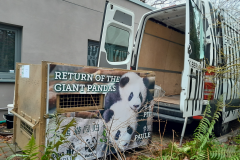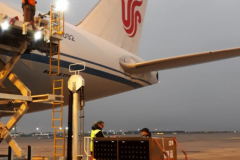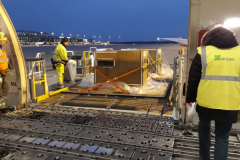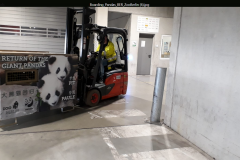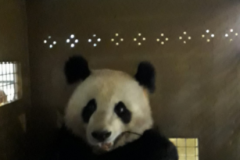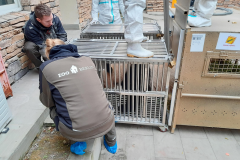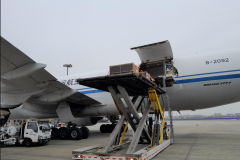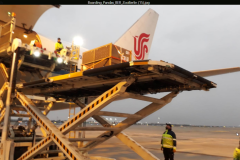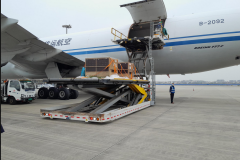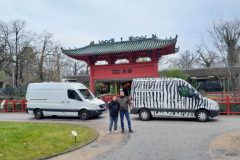 Von Berlin nach Chengdu Sicher gelandet: Pit und Paule sind gut in der Chengdu Panda Base angekommen
Von Berlin nach Chengdu Sicher gelandet: Pit und Paule sind gut in der Chengdu Panda Base angekommen
Pit und Paule sind gut in der Chengdu Panda Base angekommen
Pressemitteilung 18.12.2023
Zu Fuß wären es laut Online-Routenplaner 2.977 Stunden von Berlin nach Chengdu, in die Hauptstadt der chinesischen Provinz Sichuan. Direktflüge gibt es keine, doch für wichtige Botschafter werden alle Hebel in Bewegung gesetzt, um ihnen eine möglichst komfortable Reise zu ermöglichen – jedenfalls für so hochgradig sympathische Artenschutz-Botschafter wie diese beiden: Pit und Paule stiegen am Samstag, den 16. Dezember um 17:30 Uhr (GMT +1) an Bord einer Boeing 777-200F der Air China Cargo vom BER in die Lüfte, ihr Ziel: Chengdu, die Heimat ihrer Eltern Meng Meng und Jiao Qing. Für die ersten Große Pandas, die jemals von Deutschland nach China reisten, wurde eigens eine Frachtmaschine von Frankfurt nach Chengdu via Berlin umgeleitet, sodass ihr Flug kaum mehr als 10 Stunden betrug. Um 10:40 Uhr Ortszeit (GMT + 8) – also 3:40 Uhr Berliner Zeit – landeten die beiden wohlbehalten in der 20-Millionen-Stadt Chengdu. Begleitet wurden sie von Dr. Andreas Pauly, dem Leiter der Abteilung für Tiergesundheit, Tierschutz und Forschung im Zoo Berlin und Panda-Experte Yang Kuixing aus der Chengdu Panda Base. Beide sorgten dafür, dass es den Bärenbrüdern auf der Reise an nichts fehlte. „Den Flug haben Pit und Paule gut gemeistert, wenn der Bambus stimmt sind Pandas in der Regel sehr entspannt. So war es auch auf dem Flug“, berichtet Pauly. „Nach unserer Ankunft in Chengdu fuhren wir mit den beiden Bären direkt in die Chengdu Panda Base, wo sie zunächst für 30-Tage in Quarantäne bleiben werden.“ Begrüßt wurden Pit und Paule vor Ort von zwei ihnen vertrauten Berliner Tierpflegerinnen, die bereits einen Tag vorher in Chengdu angekommen waren. Im Zoo Berlin leben seit Sommer 2017 Deutschlands einzige Große Pandas. Am 31. August 2019 brachte Panda-Dame Meng Meng (10) zwei Baby-Pandas (Pit: 186 g und Paule: 136 g) zur Welt. Sie waren der erste Panda-Nachwuchs, der jemals in Deutschland geboren wurde. Vater Jiao Qing (13) war an der Aufzucht der Zwillinge – wie für Große Pandas typisch – nicht beteiligt. Pit und Paule lebten bereits seit November 2021 getrennt von Mutter Meng Meng. Abwechselnd bewohnten die Bären die verschiedenen Panda-Anlagen im Zoo Berlin. Die Rückkehr der beiden Jungtiere war von Anfang an vertraglich vorgesehen, die beiden Eltern bleiben für neun weitere Jahre in Berlin. „Pit und Paule haben die Herzen der Berlinerinnen im Sturm erobert und sind als erster deutscher Nachwuchs bei den Großen Pandas in die Geschichtsbücher eingegangen: In Berlin wird man die Panda-Zwillinge nie vergessen“, berichtet Zoo- und Tierparkdirektor Dr. Andreas Knieriem.
Rettungsplan für die Großen Pandas
Der Bestand der Großen Pandas in menschlicher Obhut hat sich aufgrund umfangreicher Forschungsarbeiten in den vergangenen zehn Jahren verdoppelt. Pit und Paule sind zwei von 698 Großen Pandas in menschlicher Obhut – das macht ein gutes Viertel des weltweiten Bestands aus. Laut der vierten chinesischen Pandazählung gibt es 1864 wildlebende Große Pandas in China. Daher wird der Panda auf der Roten Liste für bedrohte Arten der Weltnaturschutzunion IUCN als gefährdet eingestuft. Der Rettungsplan für den Großen Panda sieht unter anderem vor, dass zunächst eine erfolgreiche Erhaltungszucht etabliert wird, um eine sichere Reservepopulation in menschlicher Obhut aufzubauen. Dies ist inzwischen gelungen, wie die großartigen Zuchterfolge zeigen. Im nächsten Schritt wird die Wiederansiedlung von Tieren aus menschlicher Obhut weiter erforscht und vorbereitet. Erste Versuche der Wiederansiedlung waren bereits erfolgreich, dennoch ist neben der Erhaltungszucht das Bewahren und Wiederherstellen geeigneter Lebensräume die Basis für die Rettung des Großen Pandas. Bei der Renaturierung und Verknüpfung fragmentierter Lebensräume nimmt das Projekt des Giant Panda National Parks eine zentrale Rolle ein. Dieser Park ist seit dem Jahr 2020 ein großes Schutzgebiet in den Provinzen Sichuan, Gansu und Shaanxi in China. Er besteht aus etwa 70 Naturschutzgebieten und ist mehr als 22.000 Quadratkilometer groß.
From Berlin to Chengdu
Landed safely: Pit and Paule arrived at the Chengdu Panda Base According to the online route planner, it would take 2,977 hours on foot from Berlin to Chengdu, the capital of the Chinese province of Sichuan. There are no direct flights, but for important ambassadors, every effort is made to make their journey as comfortable as possible – at least for such highly likeable conservation ambassadors as these two: Pit and Paule took to the skies at 17:30 (GMT +1) on Saturday 16 December on board an Air China Cargo Boeing 777-200F from BER, their destination: Chengdu, the home of their parents Meng Meng and Jiao Qing. A cargo plane was specially diverted from Frankfurt to Chengdu via Berlin for the first giant pandas ever to travel from Germany to China, so that their flight took little more than 10 hours. At 10.40 a.m. local time (GMT + 8) – 3.40 a.m. Berlin time – the two landed safely in Chengdu, a city of 20 million inhabitants. They were accompanied by Dr Andreas Pauly, Head of the Department of Animal Health, Animal Welfare and Research at Zoo Berlin, and panda expert Yang Kuixing from the Chengdu Panda Base. Both ensured that the bear brothers wanted for nothing on the journey. „Pit and Paule coped well with the flight; when the bamboo is right, pandas are usually very relaxed. It was the same on the flight,“ reports Pauly. „After arriving in Chengdu, we took the two bears straight to the Chengdu Panda Base, where they will initially remain in quarantine for 30 days.“ Pit and Paule were greeted on site by two familiar Berlin animal keepers who had already arrived in Chengdu the day before. Zoo Berlin has been home to Germany’s only giant pandas since summer 2017. On 31 August 2019, female panda Meng Meng (10) gave birth to two baby pandas (Pit: 186 g and Paule: 136 g). They were the first panda offspring ever born in Germany. As is typical for giant pandas, father Jiao Qing (13) was not involved in the rearing of the twins. Pit and Paule had been living separately from their mother Meng Meng since November 2021. The bears took turns living in the various panda enclosures at Zoo Berlin. The return of the two cubs was contractually agreed from the outset, and the two parents will remain in Berlin for another nine years. „Pit and Paule have taken the hearts of Berliners by storm and have gone down in the history books as the first German offspring of giant pandas: The panda twins will never be forgotten in Berlin,“ reports Zoo and Tierpark Director Dr Andreas Knieriem.
Rescue plan for giant pandas
The population of giant pandas in human care has doubled over the past ten years as a result of extensive research. Pit and Paule are two of 698 giant pandas in human care – a good quarter of the global population. According to the fourth Chinese panda census, there are 1864 wild giant pandas in China. The panda is therefore classified as endangered on the Red List of Threatened Species of the International Union for Conservation of Nature (IUCN). The rescue plan for the giant panda envisages, among other things, that successful conservation breeding will first be established in order to build up a secure reserve population in human care. This has now been achieved, as the great breeding successes show. The next step is to continue researching and preparing the reintroduction of animals from human care. Initial attempts at reintroduction have already been successful, but in addition to conservation breeding, the preservation and restoration of suitable habitats is the basis for saving the giant panda. The Giant Panda National Park project plays a central role in renaturalising and connecting fragmented habitats. This park has been a large protected area in the provinces of Sichuan, Gansu and Shaanxi in China since 2020. It consists of around 70 nature reserves and covers more than 22,000 square kilometres.
